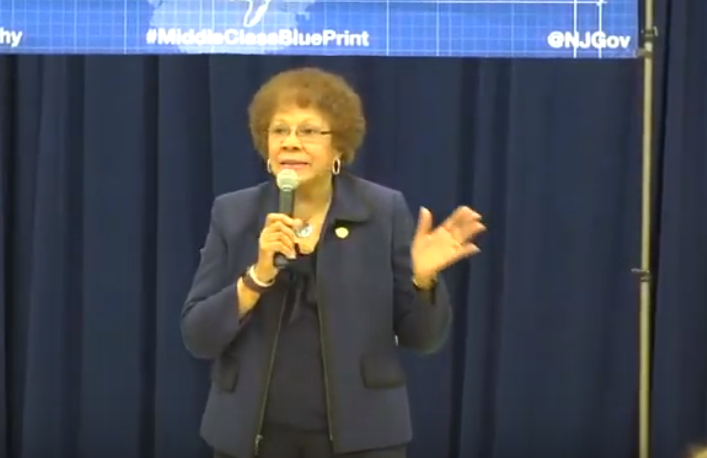Veteran Senator Turner Presses for the Posting of Civilian Review Board Bill

Senator Shirley Turner (D-15) has spent over 20 years reforming and trying to reform the police, and on the heels of this week's historic guilty verdict in the Derek Chauvin murder trial, the veteran Mercer County senator itemized the 2021 legislation she prioritizes, including criminalizing police chokeholds, requiring law enforcement officials to live in the towns they serve, not incentivizing police officers to seek quotas in the issuing of tickets or arrests, and making changes to improve recruitment and diversity in law enforcement.
She also wants the Legislature and Governor Phil Murphy to to sign into law Assembly Bill 4656, which would authorize municipalities to create civilian review boards with full subpoena powers to oversee police.
She realizes it is a difficult year for legislation that police vehemently oppose, in the case of A-4656, and went to the courts to block.
But, she insisted, "Hope springs eternal.
"We know now because of the verdict that occurred we have more sympathy now and more support to reform some of the policing that has taken place in the country and in this state for decades," said Turner. "This will be a heavier lift [than body cameras and other reforms achieved in 2020]. we passed some low hanging fruit but we are coming to where the rubber meets the road.
"I'm hopeful we can get that done by the end of this session," added the veteran senator. "I realize time is not on our side. This is an election year. We only have a few sessions left before the summer break and we go into campaign mode. There is not much of an appetite for anything requiring heavy lifting, but I will be pushing for this to be heard and passed in this session."
Turner's police reform journey started in 1998 when she was first elected to the senate.
There was a police shooting on the NJ Turnpike.
"Everybody kept telling us - that is black people - that there was no racial profiling," Turner recalled.
She joined a party of black legislators and ministers that went to Washington, D.C. to meet with then-Deputy Attorney General Eric Holder and then-U.S. Senator Frank Lautenberg (D-NJ) to get help to eliminate racial profiling.
Turner suggested to Senator Lautenberg that New Jersey enforcement have cameras on police cars.
"Senator Lautenberg was concerned about the cost," Turner said. "We held hearings up and down the state and had people come in and testify. As a result the federal government did establish a consent decree and we did establish that there was indeed racial profiling."
Fast forward to 2014, when police killed Michael Brown in Ferguson, Missouri.
"There was no record as to what really occurred there and that's when I introduced the bill that would establish body cameras," Turner said. "I could not get it out of the law and public safety committee. Again, social justice costs too much. I continued to introduce it, in every session, and finally after George Floyd died as a result of a knee on his neck that the whole country as well as the world saw, people came to see there was a disparity in the way black people were being excessively treated with force. After that and the demonstrations that occurred, the human cry was for social justice and it wasn't just black people - but all races - all who saw what happened to George Floyd in May of last year and they couldn't deny it any longer."
The pandemic shone the light on the issue, said Turner.
People sitting at home watched the filmed murder on television.
"They saw George Floyd with a police officer with a knee on his neck," said Turner. "That put wind in the sails of my bill for the body cameras. It was passed by both houses and signed into law by the governor.
"We would have had them long before now," she added.
But it was always cost.
Of course, what people see on camera isn't always the same - as NJPBA Prez Pat Colligan upbraided U.S. Senator Cory Booker (D-NJ) in a letter today after the senator reacted with horror to the latest police killing in Columbus, Ohio.
But George Floyd's murder prodded the state legislature here to move on body cameras, which for Turner was an inflection point on a legislative journey that started over 20 years ago.
"Body cameras [in addition to civilians filming police activities] have paid off," she said. "They have done a great service to justice in this country."





